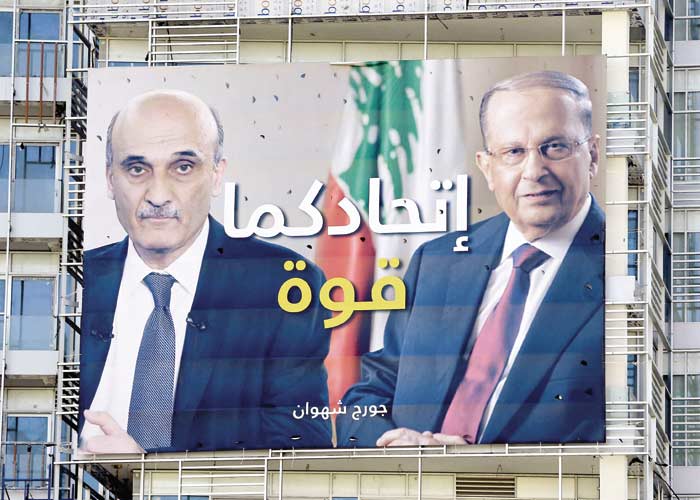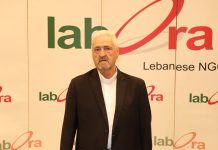The Hopes, Fears and Lost Role of Lebanon’s Christians
Dalal Saoud/The Arab Weekly/December 06/16
Beirut — Now that strong Christian leader Michel Aoun is settled in the presidential palace, a general feeling of hope has engulfed Lebanon’s Christians for he is the one who has long promised to restore their rights and end their growing frustration for having been marginalised since the end of the 1975-90 civil war.
The Christians have seen their presence, influence and role decline in the tiny multi-confessional country. Their political dominance came to an end with the 1989 Taif accords, the national reconciliation agreement that ended the country’s civil war and established equal power-sharing between Christians and Muslims.
The redistribution of powers under the Saudi-brokered Taif accords put in place a fairer formula by introducing constitutional reforms long demanded by the Muslims. But that left the Christians bitter. With such a political confessional system, no sect would be eternally happy and each one would attempt to tilt the balance of power once gaining enough strength.
The Lebanese suffered a long and destructive war but failed to get rid of their sectarian system and establish a civil state. As late prime minister Rafik Hariri told this reporter shortly before he took power in 1992: “Look around you (the Arab region), this is the best we could achieve.” He was referring to the Taif agreement, which is seen by some today as a good model to stop the raging wars in Syria, Yemen and Libya.
“We stopped counting,” Hariri, a Sunni Muslim, then said and kept repeating until he was killed in a massive explosion that targeted his convoy in Beirut on February 14, 2005. By that, he meant whatever demographic changes would occur; the Christians and Muslims would keep on having an equal share of power.
Hariri’s assassination and popular demonstrations that broke out forced Syria to pull its troops out of Lebanon on April 26, 2005, ending 29 years of heavy-handed control of the country. Shortly afterwards, Christian strongmen made a long-awaited comeback, with Aoun returning to the country from 15 years in exile and Samir Geagea, leader of the Lebanese Forces militia, pardoned and released from prison after spending 11 years in solitary confinement.
With Syria’s influence almost out of the equation, the Lebanese found themselves trapped in a struggle over who would rule the country and how to do so, being divided between the emerging pro-Syria/Iran March 8 and pro-Saudi/US March 14 alliances.
“From 1990 till 2005, one cannot speak of power sharing in Lebanon because the country was under Syrian rule,” said Bassel Salloukh, an associate professor of political science at the Lebanese American University in Beirut. “It was really after the Hariri assassination and the withdrawal of the Syrian troops that we started discovering the problem of post-war power-sharing, which was supposed to have been resolved with Taif but wasn’t.”
Salloukh explained that although both March 8 and March 14 were multi-sectarian alliances, the struggle was in reality between “the two most powerful actors” in these two coalitions: Shia Hezbollah and the Sunni Future Movement.
Aoun sided with Hezbollah and Geagea with Hariri’s Future Movement before they recently joined hands to create what they described as the strongest Christian force that led — when Hariri finally endorsed him — to Aoun’s election as president. Such a new emerging Christian force and a possible Christian- Sunni alliance seem to unnerve the powerful Shia Hezbollah-Amal bloc.
Despite their dwindling numbers, the Christians maintained their privileges, preserving the posts of president of the republic, army commander, Central Bank governor and army intelligence chief, in addition to their 50% quota of parliamentary seats. According to various unofficial statistics, the Christians constitute 30-40% of Lebanon’s population.
“The Christians are over-represented given their demographics but this is not the issue,” said Salloukh. He referred to the electoral laws under which “around 50% of Christian MPs are elected in Muslim-majority electoral districts”. With the increased sectarian tension, “that has exacerbated feelings among the Christian political elites of being increasingly marginalised and one has to understand this,” Salloukh said. “You have to give the Christians some kind of credibility in the system. It is not just about numbers.”
Any attempt by the Christians to return to the pre-Taif times “is impossible”, said Fares Souaid, March 14secretary-general, himself a Christian. He pointed to the Lebanese constitution, which “is the only such constitution in the Arab world where Muslims and Christians share power” and to the Muslim-Christian coexistence, which “is a message to the West that Islam is able to coexist with non-Muslims”. The Christians of Lebanon, he said, can play a positive role if they drop their fears and “return to their nationalistic speech” and “read well what’s going on in the region”. “If they act as frightened minorities looking for outside protection and minority alliances, I think they will lose the battle sooner or later,” Souaid said.
Absorbed by their own fears, divisions and interests, the Christians have probably missed a golden opportunity to try reconcile Lebanon’s Shias and Sunnis and be the driving force behind establishing a civil state.
**Dalal Saoud is the Deputy Editor-in-Chief of The Arab Weekly. She is based in Beirut.
Copyright ©2016 The Arab Weekly




















